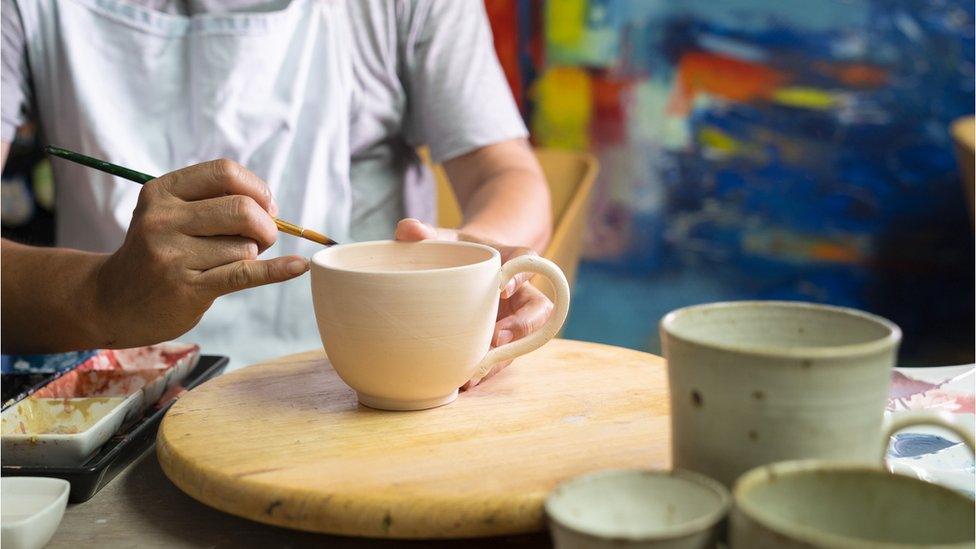Evidence of more business start-ups in Scotland
- Published

The pandemic allowed more people time and space to indulge their interests and start their own businesses
The low rate of business start-ups has long been lamented in Scotland, but there is growing evidence that it is picking up.
A Strathclyde Business School survey found strongest activity among those aged 18 to 24 and non-white ethnic groups. Activity is as likely among the poorest Scots as the wealthiest.
The pandemic, bringing the furlough scheme and reliable income, was a big opportunity for business ideas to be developed at the kitchen table. But it also cut off access to markets, and to support networks.
Economic downturns can have unforeseen positive effects. Economists talk of the "creative destruction" of weak companies disappearing and creating space for innovation.
But it can be less theoretical. In the 1970s and 1980s, it is argued that one of the key drivers of Britain's world-leading musical creativity was unemployment. Dole money gave sufficient financial space for wannabe music stars to get their act together.
And in the sudden pandemic crash of 2020, a huge opportunity for business creativity opened up. If you couldn't do your job because of lockdown rules, you could be furloughed. And so it continues for another four weeks.
The state was willing to fund 80% of your normal wages, in return for, well, an assurance that you weren't working at your normal job. (Yes, I know, it's now 60%.)
What could be better to get the entrepreneurial juices flowing than a lot of spare time and a reliable source of income?
Indulging interests
As the earlier stages of furlough saw it used most often for younger workers, often in hospitality, travel, leisure and culture, this resonated with the Gen Z vibe.
This is the generation which gave us the "side hustle" - a sideline that boosts income, indulges an interest, or that could be grown into something bigger.
And it wasn't only young people who were locked out of normal work, to discover they could make a living at something else, and often something they enjoy more than salaried work.
Chefs, for instance, are hard to recruit now, partly because some have seen opportunities beyond small, hot kitchens, with unsocial working hours, to be self-employed and selling food from their homes.

Some chefs have swapped hot restaurant kitchens for making and selling food from home
A survey in spring by Virgin Start-up, an entrepreneurial hub, suggested that two million British people had set up side hustles during lockdown.
It cited figures for UK company formation last year. After lockdown brought an initial slump, from May onwards, the average weekly number was up nearly 30% on 2019, from 12,446 to 16,157.
One in eight
We can see at least some indications of this from Strathclyde Business School research, indicating that Scotland is gradually climbing out of a long-time rut of poor business start-up rates.
The Global Entrepreneurship Monitor is based on a wide-ranging and international survey of 146,000 people from 46 economies, including 2,000 Scots. It is of sufficient scale to allow its research teams to drill down into business start-up activity.
The results for Scotland show that nearly 250,000 Scots recently became active in starting up businesses. That doesn't mean they succeeded in doing so, but that they engaged in that process.
That's one in 14 of us. A further 194,000 were entrepreneurs running more established businesses.
The research suggests that 60,000 or so young people in Scotland, or 13% of those aged 18 to 24 were early-stage entrepreneurs. At one in eight, that was the highest rate of the four UK home nations.
Compare that with only 13 years ago, when a previous pulse of this survey showed that only 3.5% of Scots aged under 30 were engaged in business start-ups.
Rich and poor
The research tells us there is a persistent gender gap, with men more likely to be risk-taking on business ideas.
Non-white ethnic groups were markedly more engaged, with 13% showing signs of early stage start-up activity, compared with 7% for the white majority.
The Highlands and islands came top within Scotland, while in the north-east - previously inspired by the oil industry into drilling for opportunities - is falling behind its neighbours.

About one in 14 Scots recently became active in starting a business
And the figures were holding steady while they dropped in England, Wales and Northern Ireland.
The spark can be found cross the income spectrum, with start-ups as likely in the wealthiest 20% as the least wealthy 20%. That is not true of the rest of the UK.
Socially distanced
All this looks like good news. It reflects a lot of effort to turn around that deep-seated problem with Scotland's economy. Entrepreneurialism has been built into university courses and has had structured programmes in schools, with tailored support from organisations such as the Prince's Trust.
But one of the Strathclyde researchers, Samuel Mwaura, sounds some notes of caution.
"Historically, we know that new businesses play a vital role in the recovery from major crises, however in 2020 immediate and sustained efforts to mitigate the coronavirus crisis prioritised more established businesses to the neglect of start-up entrepreneurs," he says.
In other words, banks were told to push money out the door to keep firms afloat. They may have given a much lower priority to meeting, eye-balling and sizing up people with an idea and in need of a first business loan. Or Covid restrictions simply meant they could not.
The lack of social interaction isn't only at the bank branch. It has been lacking in business incubators and networks. While time and state-subsidised income has been plentiful, there's been much less opportunity to meet others who are doing similar things, cross-fertilising the knowledge base, and building teams.
Without that, thousands of those captured in this survey as developing their business idea were less likely to be able to make things happen, and take the idea to market.
"It is likely that many of these businesses will never see the light of day," says Dr Mwaura.
Related topics
- Published18 January 2019

